Shuliang Liu
A Visual Semantic Adaptive Watermark grounded by Prefix-Tuning for Large Vision-Language Model
Jan 12, 2026Abstract:Watermarking has emerged as a pivotal solution for content traceability and intellectual property protection in Large Vision-Language Models (LVLMs). However, vision-agnostic watermarks introduce visually irrelevant tokens and disrupt visual grounding by enforcing indiscriminate pseudo-random biases, while some semantic-aware methods incur prohibitive inference latency due to rejection sampling. In this paper, we propose the VIsual Semantic Adaptive Watermark (VISA-Mark), a novel framework that embeds detectable signals while strictly preserving visual fidelity. Our approach employs a lightweight, efficiently trained prefix-tuner to extract dynamic Visual-Evidence Weights, which quantify the evidentiary support for candidate tokens based on the visual input. These weights guide an adaptive vocabulary partitioning and logits perturbation mechanism, concentrating watermark strength specifically on visually-supported tokens. By actively aligning the watermark with visual evidence, VISA-Mark effectively maintains visual fidelity. Empirical results confirm that VISA-Mark outperforms conventional methods with a 7.8% improvement in visual consistency (Chair-I) and superior semantic fidelity. The framework maintains highly competitive detection accuracy (96.88% AUC) and robust attack resilience (99.3%) without sacrificing inference efficiency, effectively establishing a new standard for reliability-preserving multimodal watermarking.
Vision-Language Introspection: Mitigating Overconfident Hallucinations in MLLMs via Interpretable Bi-Causal Steering
Jan 08, 2026Abstract:Object hallucination critically undermines the reliability of Multimodal Large Language Models, often stemming from a fundamental failure in cognitive introspection, where models blindly trust linguistic priors over specific visual evidence. Existing mitigations remain limited: contrastive decoding approaches operate superficially without rectifying internal semantic misalignments, while current latent steering methods rely on static vectors that lack instance-specific precision. We introduce Vision-Language Introspection (VLI), a training-free inference framework that simulates a metacognitive self-correction process. VLI first performs Attributive Introspection to diagnose hallucination risks via probabilistic conflict detection and localize the causal visual anchors. It then employs Interpretable Bi-Causal Steering to actively modulate the inference process, dynamically isolating visual evidence from background noise while neutralizing blind confidence through adaptive calibration. VLI achieves state-of-the-art performance on advanced models, reducing object hallucination rates by 12.67% on MMHal-Bench and improving accuracy by 5.8% on POPE.
Distilling the Thought, Watermarking the Answer: A Principle Semantic Guided Watermark for Large Reasoning Models
Jan 08, 2026Abstract:Reasoning Large Language Models (RLLMs) excelling in complex tasks present unique challenges for digital watermarking, as existing methods often disrupt logical coherence or incur high computational costs. Token-based watermarking techniques can corrupt the reasoning flow by applying pseudo-random biases, while semantic-aware approaches improve quality but introduce significant latency or require auxiliary models. This paper introduces ReasonMark, a novel watermarking framework specifically designed for reasoning-intensive LLMs. Our approach decouples generation into an undisturbed Thinking Phase and a watermarked Answering Phase. We propose a Criticality Score to identify semantically pivotal tokens from the reasoning trace, which are distilled into a Principal Semantic Vector (PSV). The PSV then guides a semantically-adaptive mechanism that modulates watermark strength based on token-PSV alignment, ensuring robustness without compromising logical integrity. Extensive experiments show ReasonMark surpasses state-of-the-art methods by reducing text Perplexity by 0.35, increasing translation BLEU score by 0.164, and raising mathematical accuracy by 0.67 points. These advancements are achieved alongside a 0.34% higher watermark detection AUC and stronger robustness to attacks, all with a negligible increase in latency. This work enables the traceable and trustworthy deployment of reasoning LLMs in real-world applications.
VLA-Mark: A cross modal watermark for large vision-language alignment model
Jul 18, 2025



Abstract:Vision-language models demand watermarking solutions that protect intellectual property without compromising multimodal coherence. Existing text watermarking methods disrupt visual-textual alignment through biased token selection and static strategies, leaving semantic-critical concepts vulnerable. We propose VLA-Mark, a vision-aligned framework that embeds detectable watermarks while preserving semantic fidelity through cross-modal coordination. Our approach integrates multiscale visual-textual alignment metrics, combining localized patch affinity, global semantic coherence, and contextual attention patterns, to guide watermark injection without model retraining. An entropy-sensitive mechanism dynamically balances watermark strength and semantic preservation, prioritizing visual grounding during low-uncertainty generation phases. Experiments show 7.4% lower PPL and 26.6% higher BLEU than conventional methods, with near-perfect detection (98.8% AUC). The framework demonstrates 96.1\% attack resilience against attacks such as paraphrasing and synonym substitution, while maintaining text-visual consistency, establishing new standards for quality-preserving multimodal watermarking
Unveiling Instruction-Specific Neurons & Experts: An Analytical Framework for LLM's Instruction-Following Capabilities
May 27, 2025Abstract:The finetuning of Large Language Models (LLMs) has significantly advanced their instruction-following capabilities, yet the underlying computational mechanisms driving these improvements remain poorly understood. This study systematically examines how fine-tuning reconfigures LLM computations by isolating and analyzing instruction-specific sparse components, i.e., neurons in dense models and both neurons and experts in Mixture-of-Experts (MoE) architectures. In particular, we introduce HexaInst, a carefully curated and balanced instructional dataset spanning six distinct categories, and propose SPARCOM, a novel analytical framework comprising three key contributions: (1) a method for identifying these sparse components, (2) an evaluation of their functional generality and uniqueness, and (3) a systematic comparison of their alterations. Through experiments, we demonstrate functional generality, uniqueness, and the critical role of these components in instruction execution. By elucidating the relationship between fine-tuning-induced adaptations and sparse computational substrates, this work provides deeper insights into how LLMs internalize instruction-following behavior for the trustworthy LLM community.
Do BERT-Like Bidirectional Models Still Perform Better on Text Classification in the Era of LLMs?
May 23, 2025Abstract:The rapid adoption of LLMs has overshadowed the potential advantages of traditional BERT-like models in text classification. This study challenges the prevailing "LLM-centric" trend by systematically comparing three category methods, i.e., BERT-like models fine-tuning, LLM internal state utilization, and zero-shot inference across six high-difficulty datasets. Our findings reveal that BERT-like models often outperform LLMs. We further categorize datasets into three types, perform PCA and probing experiments, and identify task-specific model strengths: BERT-like models excel in pattern-driven tasks, while LLMs dominate those requiring deep semantics or world knowledge. Based on this, we propose TaMAS, a fine-grained task selection strategy, advocating for a nuanced, task-driven approach over a one-size-fits-all reliance on LLMs.
TreeHop: Generate and Filter Next Query Embeddings Efficiently for Multi-hop Question Answering
Apr 30, 2025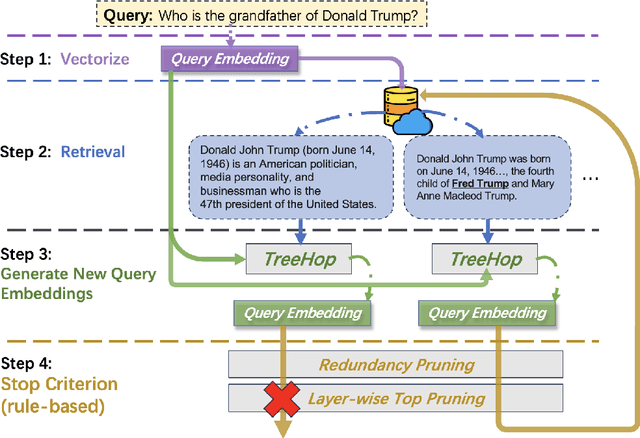

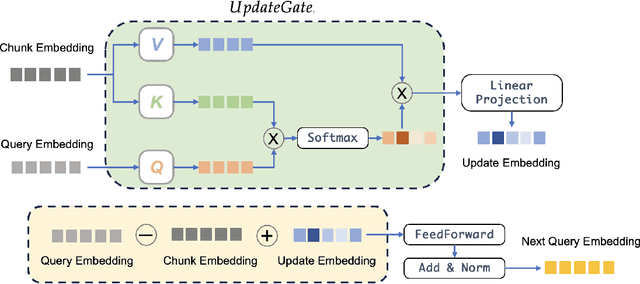

Abstract:Retrieval-augmented generation (RAG) systems face significant challenges in multi-hop question answering (MHQA), where complex queries require synthesizing information across multiple document chunks. Existing approaches typically rely on iterative LLM-based query rewriting and routing, resulting in high computational costs due to repeated LLM invocations and multi-stage processes. To address these limitations, we propose TreeHop, an embedding-level framework without the need for LLMs in query refinement. TreeHop dynamically updates query embeddings by fusing semantic information from prior queries and retrieved documents, enabling iterative retrieval through embedding-space operations alone. This method replaces the traditional "Retrieve-Rewrite-Vectorize-Retrieve" cycle with a streamlined "Retrieve-Embed-Retrieve" loop, significantly reducing computational overhead. Moreover, a rule-based stop criterion is introduced to further prune redundant retrievals, balancing efficiency and recall rate. Experimental results show that TreeHop rivals advanced RAG methods across three open-domain MHQA datasets, achieving comparable performance with only 5\%-0.4\% of the model parameter size and reducing the query latency by approximately 99\% compared to concurrent approaches. This makes TreeHop a faster and more cost-effective solution for deployment in a range of knowledge-intensive applications. For reproducibility purposes, codes and data are available here: https://github.com/allen-li1231/TreeHop-RAG.
CoheMark: A Novel Sentence-Level Watermark for Enhanced Text Quality
Apr 24, 2025Abstract:Watermarking technology is a method used to trace the usage of content generated by large language models. Sentence-level watermarking aids in preserving the semantic integrity within individual sentences while maintaining greater robustness. However, many existing sentence-level watermarking techniques depend on arbitrary segmentation or generation processes to embed watermarks, which can limit the availability of appropriate sentences. This limitation, in turn, compromises the quality of the generated response. To address the challenge of balancing high text quality with robust watermark detection, we propose CoheMark, an advanced sentence-level watermarking technique that exploits the cohesive relationships between sentences for better logical fluency. The core methodology of CoheMark involves selecting sentences through trained fuzzy c-means clustering and applying specific next sentence selection criteria. Experimental evaluations demonstrate that CoheMark achieves strong watermark strength while exerting minimal impact on text quality.
Judge as A Judge: Improving the Evaluation of Retrieval-Augmented Generation through the Judge-Consistency of Large Language Models
Feb 26, 2025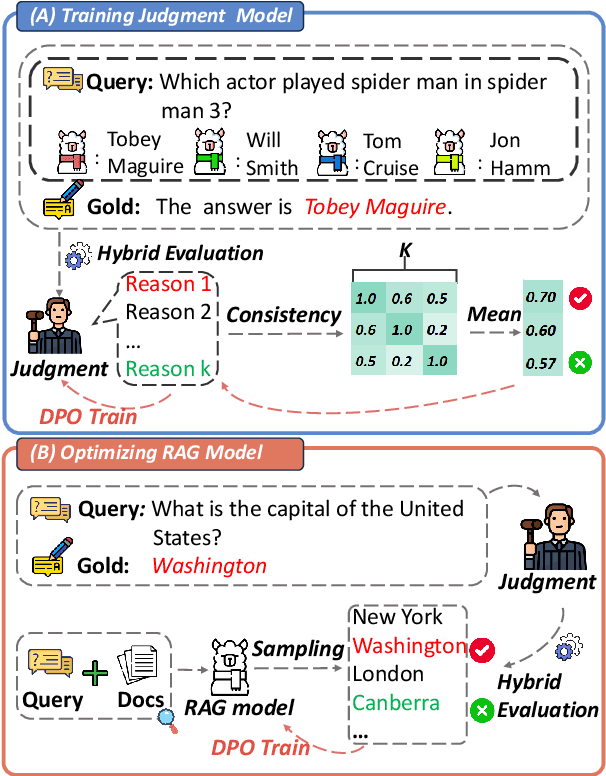
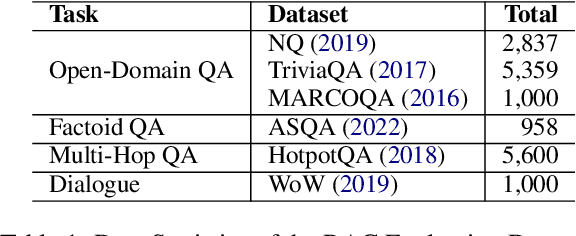
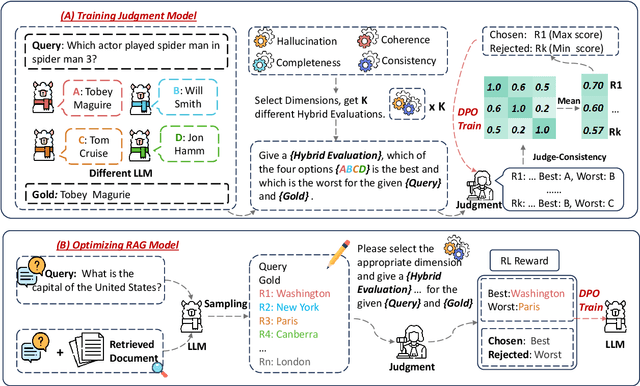
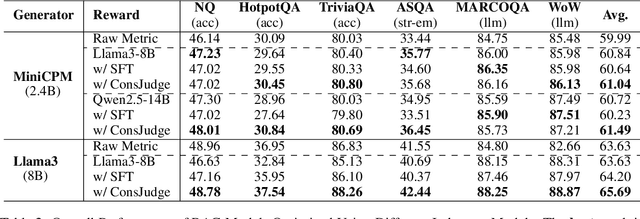
Abstract:Retrieval-Augmented Generation (RAG) has proven its effectiveness in alleviating hallucinations for Large Language Models (LLMs). However, existing automated evaluation metrics cannot fairly evaluate the outputs generated by RAG models during training and evaluation. LLM-based judgment models provide the potential to produce high-quality judgments, but they are highly sensitive to evaluation prompts, leading to inconsistencies when judging the output of RAG models. This paper introduces the Judge-Consistency (ConsJudge) method, which aims to enhance LLMs to generate more accurate evaluations for RAG models. Specifically, ConsJudge prompts LLMs to generate different judgments based on various combinations of judgment dimensions, utilize the judge-consistency to evaluate these judgments and select the accepted and rejected judgments for DPO training. Our experiments show that ConsJudge can effectively provide more accurate judgments for optimizing RAG models across various RAG models and datasets. Further analysis reveals that judgments generated by ConsJudge have a high agreement with the superior LLM. All codes are available at https://github.com/OpenBMB/ConsJudge.
SAFEERASER: Enhancing Safety in Multimodal Large Language Models through Multimodal Machine Unlearning
Feb 18, 2025Abstract:As Multimodal Large Language Models (MLLMs) develop, their potential security issues have become increasingly prominent. Machine Unlearning (MU), as an effective strategy for forgetting specific knowledge in training data, has been widely used in privacy protection. However, MU for safety in MLLM has yet to be fully explored. To address this issue, we propose SAFEERASER, a safety unlearning benchmark for MLLMs, consisting of 3,000 images and 28.8K VQA pairs. We comprehensively evaluate unlearning methods from two perspectives: forget quality and model utility. Our findings show that existing MU methods struggle to maintain model performance while implementing the forget operation and often suffer from over-forgetting. Hence, we introduce Prompt Decouple (PD) Loss to alleviate over-forgetting through decouple prompt during unlearning process. To quantitatively measure over-forgetting mitigated by PD Loss, we propose a new metric called Safe Answer Refusal Rate (SARR). Experimental results demonstrate that combining PD Loss with existing unlearning methods can effectively prevent over-forgetting and achieve a decrease of 79.5% in the SARR metric of LLaVA-7B and LLaVA-13B, while maintaining forget quality and model utility. Our code and dataset will be released upon acceptance. Warning: This paper contains examples of harmful language and images, and reader discretion is recommended.
 Add to Chrome
Add to Chrome Add to Firefox
Add to Firefox Add to Edge
Add to Edge